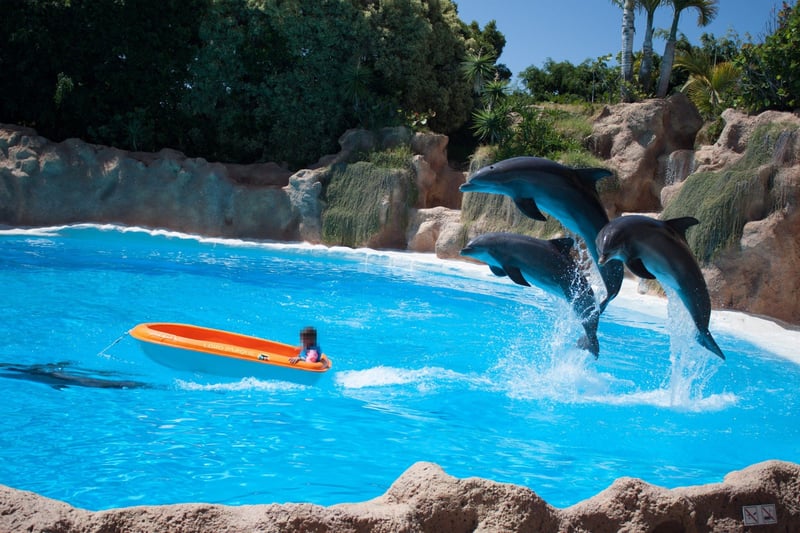
We released a video and a letter signed by 23 respected scientists, clearly explaining why whales and dolphins (known together as “cetaceans”) are not suited to living in captivity and why accreditation doesn’t work when it comes to dolphin entertainment venues.
What is accreditation?
Accreditation is recognition, often from a third-party, that an organization or product meets specific guidelines, usually allowing it to use a logo or a label to give it the stamp of approval.
Accreditation or a recognizable label can help us feel better about our choices—it gives us the security that somebody else has done the “ethical checklist” on our behalf and we can enjoy that choice guilt-free. This doesn’t just apply to vacation attractions—we are all familiar with labels on tea, fruit, clothes, even chocolate. Accreditation can provide a quick short-cut in the brain that tells us that something is an “ethical choice.”
Equally, travel companies and tourists may see accreditations awarded to wildlife entertainment venues or a logo showing that a venue is part of a membership organization and think that makes them ethical.
Behind the label
Sadly, it’s not as simple as that. We still need to look at exactly what that accreditation means—and, importantly, what it doesn’t mean.
WAZA has a Code of Ethics that states that a member facility should “not demean or trivialize the animal in any way.” Yet our recent report found numerous WAZA member facilities violating these standards.
WAZA has stated that it has no power to enforce or demand standards of zoos belonging to its member associations. This is fine if people know and understand that. But when a tour operator uses a venue’s membership as though it is accreditation and justifies including a venue in its offers because it is a WAZA member, then it is misleading. If tour operators believe membership is akin to accreditation and reassure tourists using a membership model as their ethical measure, then we begin to see a greenwashing effect, even if it is unintended. This means that a venue (or product) gives a false impression it meets specific ethical or environmental criteria.
AMMPA has an accreditation program that involves a two-day inspection, but the standards are set internally by the industry rather than by independent experts.
“Over thirty years of research on captive and free-ranging cetaceans has convinced me that dolphins and whales are particularly poorly suited for captivity. In particular, WAZA and AMMPA treat cetaceans as commodities as they buy, sell, trade, and imprison them. Relying on WAZA and AMMPA to protect the welfare of cetaceans is to deny cetaceans any real opportunities to thrive.” – Toni Frohoff, Ph.D., Ethologist & Behavioral Biologist, Advancing Interspecies Science and Advocacy for Animals and Nature
The facts
- The average dolphin tank is 200,000 times smaller than their home range.
- In the wild, cetaceans can reach speeds as high as 30mph and dive from 1,600 – 3,000 ft deep.
- Dolphins are highly intelligent and have complex social norms.
- A dolphin will never be able to express their full range of natural behaviors in captivity.
- Captive whales and dolphins can be seen behaving stereotypically: circling or showing repetitive actions or laying inert near the surface of a tank (known as “logging”) for extended periods of time.
- Many species of whales and dolphins face shortened lives in captivity and suffer from numerous stress-related infections, broken teeth, aggression from tank mates, ulcers, and other ailments.
The sad truth is that fundamentally cetaceans will never thrive in captivity. There is no accreditation that can provide us with appropriate assurance.
A venue that offers swimming with captive dolphins or whale and dolphin shows will never be an ethical choice, no matter what accreditation it has.
“It’s time we recognize that the only, true reason we still keep these magnificent, large-brained and socially complex animals captive is for our entertainment; entertainment for the motive of making money, and lots of it.”—Maddalena Bearzi, President and co-founder of Ocean Conservation Society
Read the full open letter from 23 marine scientists to the travel industry.
The trade of wild animals
Dolphins and whales are just some of the wild animals suffering in the wildlife entertainment and tourism industry. This industry helps fuel the multibillion-dollar global trade in wildlife, where horrific conditions cause unimaginable suffering for animals.
Captured from the wild or intensively bred in captivity, the conditions in which wild animals are kept within the wildlife trade can cause immense suffering and stress.
The growth of global tourism has driven the trade of hundreds of thousands of wild animals used for entertainment. As individual tourists, we can stop fueling the demand for cruel wildlife venues—and together, we can take action to demand a global ban on the wild animal trade, forever.